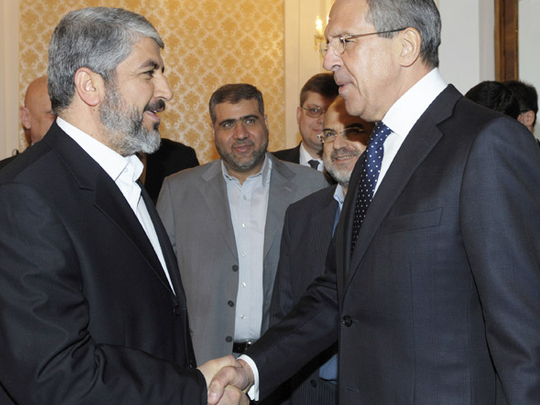
Damascus : On the surface, Khalid Mesha'al's Moscow visit focused on Palestinian reconciliation efforts, the peace process and persuading the Russians into playing a more active role in both portfolios.
On a deeper level, however, it relates to the tug-of-war between Hamas and Fatah on whether or not to jumpstart peace talks with Israel, under the auspices of the United States.
While Mesha'al was walking the red carpet in Moscow, Palestinian President Mahmoud Abbas was in Tokyo, where along with his foreign minister Riad Al Maliki, he accepted a US proposal for indirect shuttle diplomacy between the Palestinians and Israel.
Mesha'al, aware beforehand of Abbas' desire to accept the American offer, lobbied with the Russians into backing a veto of such talks.
War leadership
"I do not expect any progress in peace talks on the Palestinian, Syrian [issues] or any other direction of the Middle East settlement as the Israeli leadership is [a] leadership of war, aggression and occupation, rather than a leadership taking a stand for peace," he said.
Mesha'al timed his visit to Moscow, which was riddled with criticism for the United States, to coincide with Abbas' decision to say ‘yes' to Washington.
He sought the legitimacy of backing from a heavyweight country like Russia to avoid being confined to traditional allies like Syria, Iran, and Qatar.
For his part, Abbas said that he has no pre-conditions for peace talks, which have been on hold since the 2008 Israeli war on Gaza.
However, Abbas noted that he expects "clarifications" from President Barack Obama's Middle East envoy George Mitchell next week, as to the point of reference in any future talks.
Mesha'al noted, however, that Mitchell's visit will aim solely at pressuring Abbas into severing any reconciliation talks with Hamas.
The Hamas chief said that if Abbas remained adamant, then the United States would stop all assistance to the Palestinian National Authority (PNA).
Hamas believes that the US sponsored peace talks should only start after reconciliation is achieved between Fatah and Hamas, and after the Israel lifts its blockade on Gaza.
Mesha'al's visit has already raised eyebrows in Israel, which sent a note of protest to Moscow.
According to the Hamas leader, Moscow is backing away from US terminology that labels his group a "terrorist" organisation and willing to play a more active role in the peace process, applying adequate pressure on Israel to freeze colonies and return to the negotiating table.
In late 2009, Hamas Prime Minister Esmail Haniyah tried to reach out to the United States when he received a delegation of American doctors in Gaza.
Haniyah said Hamas welcomed a more active US role in the peace process, expressing faith in the Obama administration.
This was shortly after release of the Goldstone Report in September when everybody believed that Abbas' days in power were numbered.
Hamas tried to project itself as an alternate interlocutor to Abbas — as a strong and grassroots organisation with whom Obama could engage and do business with.
Hamas was willing to accept the borders of 1967, the Arab Peace Initiative, and the mediating role of the great powers.
In return it wanted to be treated with respect as the legitimate representative of the Palestinians in Gaza.
Vital component
While the United States could not grant that blanket, Moscow certainly could, seeing Hamas as a vital component for the upcoming peace conference it plans to hold in Russia.
Mesha'al made it clear that he does not oppose returning to the peace process in principle, especially if Hamas were the one negotiating on behalf of the Palestinians, but does not accept it so long as Gaza is besieged and divisions are rife between his camp and Fatah.
He fully understands that in order for Hamas to get legitimate status once again as leader of the Palestinian state, it needs presidential and parliamentary elections.
Once these elections take place, and while marketing its new attitude regarding peace talks, the fortunes of Hamas in the international community, having learned from the mistakes of 2006, will be reversed.












